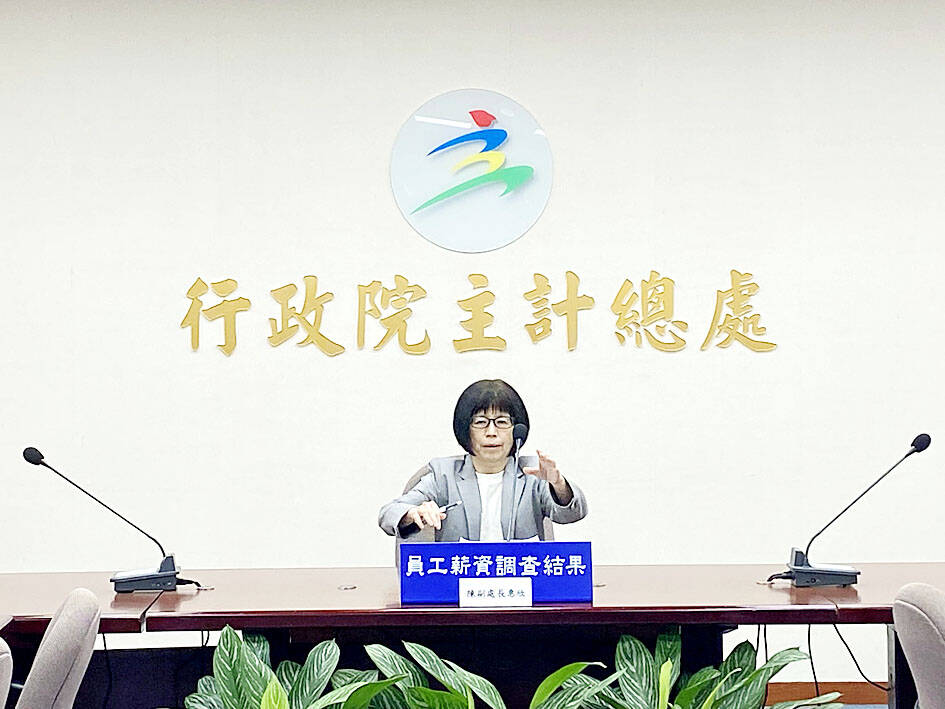Average monthly wages in April rose 2.77 percent from a year earlier to NT$46,321, while total pay — including overtime compensation, performance-based commissions and bonuses — increased 3.67 percent to NT$53,871, the Directorate-General of Budget, Accounting and Statistics (DGBAS) said yesterday.
Census Department Deputy Director Chen Hui-hsin (陳惠欣) attributed the improvement to an ongoing economic recovery that enables local firms to raise wages and perks for their employees.
Taiwan’s economy in the first quarter expanded 6.56 percent, bouncing back from a 3.49 percent contraction a year earlier, thanks to robust demand from US technology titans for electronics used in artificial intelligence applications.

Photo: Clare Cheng, Taipei Times
However, the recovery is not broad-based, as most sectors remain weighed by tepid end-market demand, government data showed.
Video content creators, financial service providers and telecoms offered relatively high regular monthly wages of NT$67,317 and NT$70,733, while hotels, restaurants and hair salons had relatively low monthly take-home pay of about NT$35,000, Chen said.
The labor accession rate shed 0.2 percentage points to 2.16 percent in April, while the dropout rate decreased 0.31 percentage points to 2.1 percent, meaning more people joined the labor force, the DGBAS said.
In the first four months, average monthly wages were NT$46,105, a 2.39 percent increase from the same period last year, while total monthly wages rose 3.62 percent to NT$67,856, the agency said.
Both figures remained in positive territory, as wages improved rapidly enough to offset the effect of inflation, Chen said.
The consumer price index in April grew a mild 1.95 percent, returning briefly to below the central bank’s 2 percent target.
Chen hesitated to say for certain if regular monthly wage hikes would continue to beat inflation, as firms would adjust compensation terms in line with their business visibility.
Sixty-eight percent of workers in Taiwan did not make monthly take-home pay in excess of NT$50,000, because service providers hire far more workers than advanced technology companies, she said.

EARLY TALKS: Measures under consideration include convincing allies to match US curbs, further restricting exports of AI chips or GPUs, and blocking Chinese investments US President Donald Trump’s administration is sketching out tougher versions of US semiconductor curbs and pressuring key allies to escalate their restrictions on China’s chip industry, an early indication the new US president plans to expand efforts that began under former US president Joe Biden to limit Beijing’s technological prowess. Trump officials recently met with their Japanese and Dutch counterparts about restricting Tokyo Electron Ltd and ASML Holding NV engineers from maintaining semiconductor gear in China, people familiar with the matter said. The aim, which was also a priority for Biden, is to see key allies match China curbs the US

The popular Taiwan Semiconductor Manufacturing Co (TSMC, 台積電) arbitrage trade might soon see a change in dynamics that could affect the trading of the US listing versus the local one. And for anyone who wants to monetize the elevated premium, Goldman Sachs Group Inc highlights potential trades. A note from the bank’s sales desk published on Friday said that demand for TSMC’s Taipei-traded stock could rise as Taiwan’s regulator is considering an amendment to local exchange-traded funds’ (ETFs) ownership. The changes, which could come in the first half of this year, could push up the current 30 percent single-stock weight limit

PROTECTION: The investigation, which takes aim at exporters such as Canada, Germany and Brazil, came days after Trump unveiled tariff hikes on steel and aluminum products US President Donald Trump on Saturday ordered a probe into potential tariffs on lumber imports — a move threatening to stoke trade tensions — while also pushing for a domestic supply boost. Trump signed an executive order instructing US Secretary of Commerce Howard Lutnick to begin an investigation “to determine the effects on the national security of imports of timber, lumber and their derivative products.” The study might result in new tariffs being imposed, which would pile on top of existing levies. The investigation takes aim at exporters like Canada, Germany and Brazil, with White House officials earlier accusing these economies of

Teleperformance SE, the largest call-center operator in the world, is rolling out an artificial intelligence (AI) system that softens English-speaking Indian workers’ accents in real time in a move the company claims would make them more understandable. The technology, called accent translation, coupled with background noise cancelation, is being deployed in call centers in India, where workers provide customer support to some of Teleperformance’s international clients. The company provides outsourced customer support and content moderation to global companies including Apple Inc, ByteDance Ltd’s (字節跳動) TikTok and Samsung Electronics Co Ltd. “When you have an Indian agent on the line, sometimes it’s hard